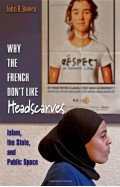- Home
- Sale
- 11.11 Sale UPTO 90% OFF
- Why the French Don't Like Headscarves: Islam, the State, and Public Space
Why the French Don't Like Headscarves: Islam, the State, and Public Space
By: John Richard Bowen
-
Rs 445.50
- Rs 990.00
- 55%
You save Rs 544.50.
Due to constant currency fluctuation, prices are subject to change with or without notice.
We're offering a high discount on this book as it is slightly damaged
Bowen argues that the focus on headscarves came from a century-old sensitivity to the public presence of religion in schools, feared links between public expressions of Islamic identity and radical Islam, and a media-driven frenzy that built support for a headscarf ban during 2003-2004. Although the defense of laïcité (secularity) was cited as the law's major justification, politicians, intellectuals, and the media linked the scarves to more concrete social anxieties--about "communalism," political Islam, and violence toward women.
Written in engaging, jargon-free prose, Why the French Don't Like Headscarves is the first comprehensive and objective analysis of this subject, in any language, and it speaks to tensions between assimilation and diversity that extend well beyond France's borders.
We're offering a high discount on this book as it is slightly damaged
Bowen argues that the focus on headscarves came from a century-old sensitivity to the public presence of religion in schools, feared links between public expressions of Islamic identity and radical Islam, and a media-driven frenzy that built support for a headscarf ban during 2003-2004. Although the defense of laïcité (secularity) was cited as the law's major justification, politicians, intellectuals, and the media linked the scarves to more concrete social anxieties--about "communalism," political Islam, and violence toward women.
Written in engaging, jargon-free prose, Why the French Don't Like Headscarves is the first comprehensive and objective analysis of this subject, in any language, and it speaks to tensions between assimilation and diversity that extend well beyond France's borders.
Why the French Don't Like Headscarves: Islam, the State, and Public Space
By: John Richard Bowen
Rs 445.50 Rs 990.00 Ex Tax :Rs 445.50
Zubin Mehta: A Musical Journey (An Authorized Biography)
By: VOID - Bakhtiar K. Dadabhoy
Rs 472.50 Rs 1,050.00 Ex Tax :Rs 472.50
Sahih AlBukhari 2 Vol Set - (HB)
By: Ahmed Bin Abdul Latif Al Zubaidi
Rs 4,121.25 Rs 5,495.00 Ex Tax :Rs 4,121.25
Summarized Sahih Al-bukhari
By: Dr. Muhammad Muhsin Khan
Rs 1,435.50 Rs 1,595.00 Ex Tax :Rs 1,435.50
Golden Stories of Abu Bakr AsSiddeeq by Abdul Malik Mujahid
By: Abdul Malik Mujahid
Rs 3,555.00 Rs 3,950.00 Ex Tax :Rs 3,555.00
No similar books from this author available at the moment.
No recently viewed books available at the moment.
Zubin Mehta: A Musical Journey (An Authorized Biography)
By: VOID - Bakhtiar K. Dadabhoy
Rs 472.50 Rs 1,050.00 Ex Tax :Rs 472.50
Why the French Don't Like Headscarves: Islam, the State, and Public Space
By: John Richard Bowen
Rs 445.50 Rs 990.00 Ex Tax :Rs 445.50














-120x187.jpg?q6)








-120x187.jpg?q6)



-120x187.jpg?q6)
